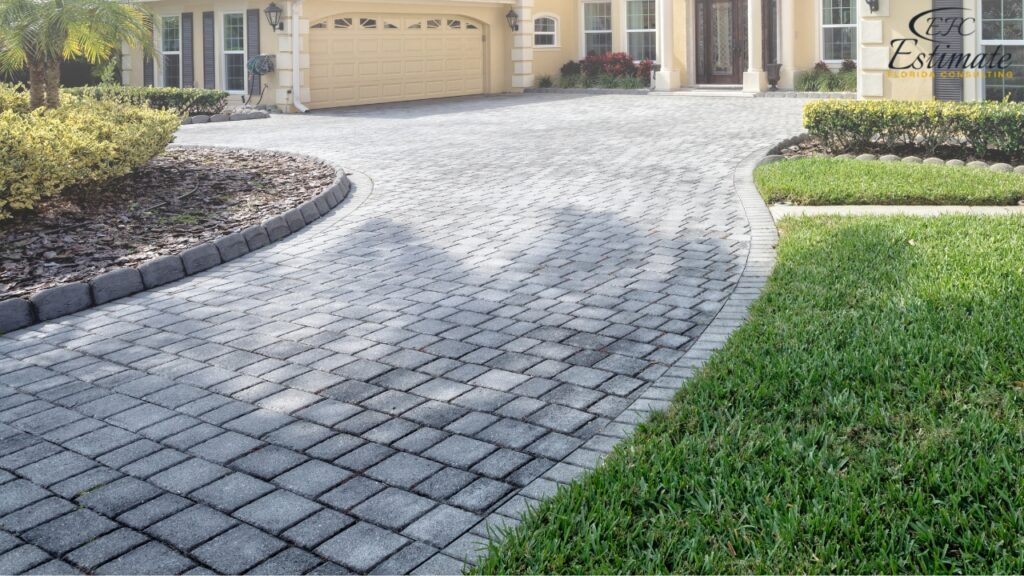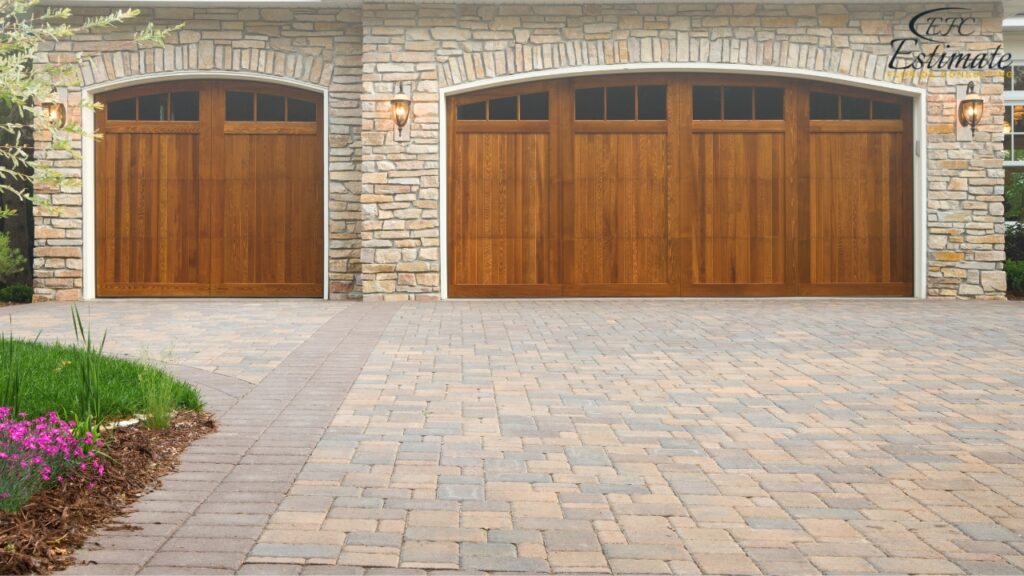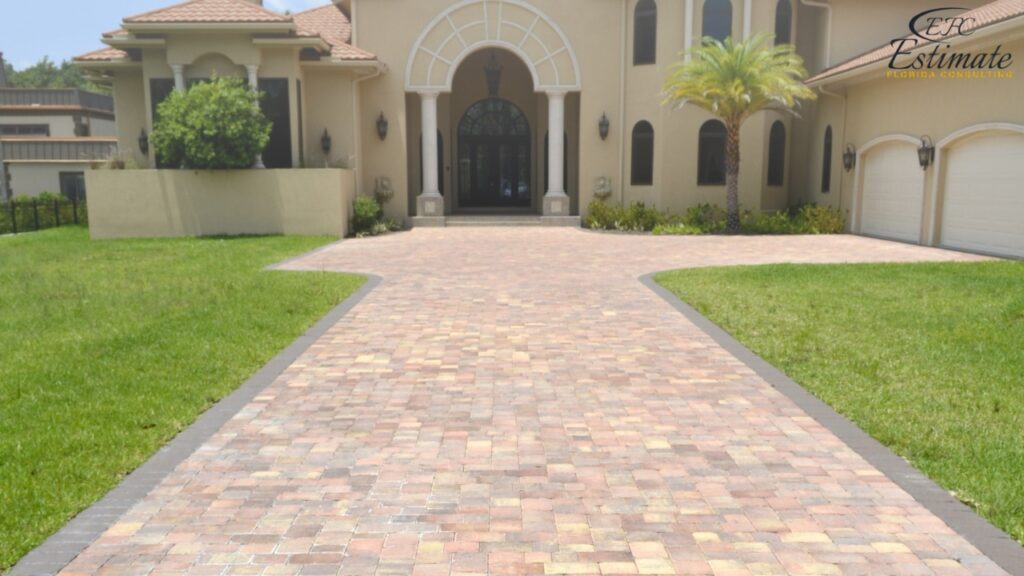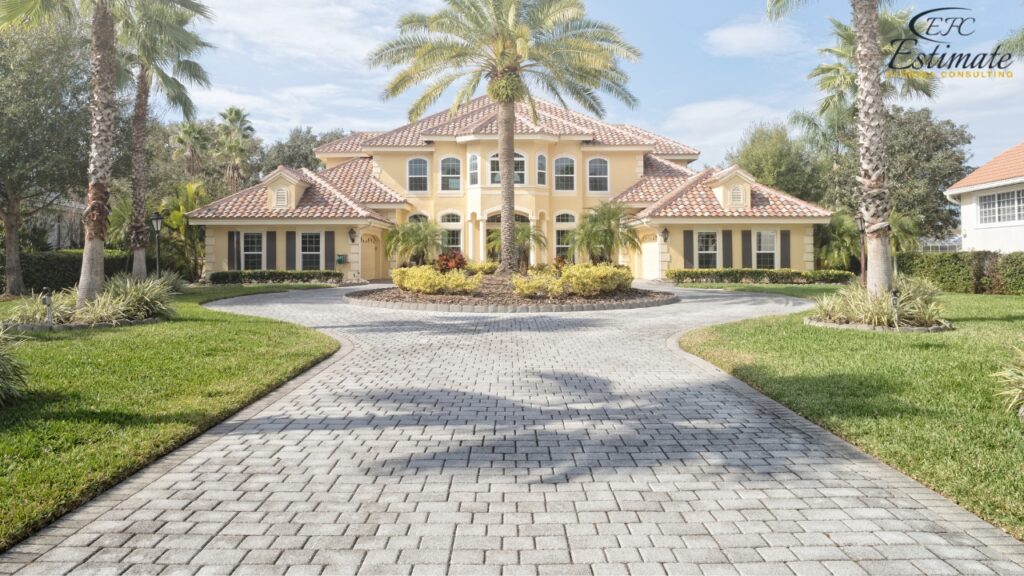How Much Does It Cost To Pave a Driveway?
The cost of paving a driveway typically ranges from $3,000 to $7,920, with a national average of around $5,400. Investing in a paved driveway can enhance your home’s value, improve curb appeal, and provide additional recreational space, making the $2.40 to $18 per square foot cost for materials and installation worthwhile. Key factors affecting the cost include the size of the driveway, the materials used, site preparation, and local labor rates.

Driveway Paving Cost Breakdown
When you receive a quote from a local driveway paving professional, the following factors will typically be included in the total estimate.
Materials
The materials you select for your driveway will significantly affect both the project’s cost and the finished look and functionality. Common materials include asphalt, concrete, gravel, and pavers. Asphalt and concrete are durable and long-lasting options but come with higher costs. Gravel is more affordable but requires more maintenance. Pavers offer a decorative look and are available in various styles and colors but tend to be the most expensive option. Each material has its pros and cons, so consider your budget, aesthetic preferences, and maintenance capabilities when making a decision.
Site Preparation and Grading
Before laying the driveway material, the base must be cleared and leveled to ensure a stable and durable foundation. The cost to level a yard averages between $1.20 and $2.40 per square foot. This process may involve removing trees, plants, and rocks, as well as addressing any existing slopes. Grading includes leveling the surface and ensuring proper drainage to prevent water pooling and erosion. Effective site preparation helps to avoid future problems such as cracking, settling, and drainage issues, making it a critical step in the driveway paving process.
Labor
Labor costs can account for up to 50% of the total price of a driveway remodel. This is due to the need for specialized equipment such as a dump truck, skid steer, roller, plate compactor, and either an asphalt paver or concrete mixer. Most homeowners do not have this equipment, making it a job best suited for professionals. On average, labor costs range from $6 to $8.40 per square foot. For a 450-square-foot driveway, this would amount to approximately $2,700. Labor costs can vary significantly based on your location, the complexity of the project, and the experience level of the crew.
Permits
Driveway installation permits generally cost between $60 and $240. Typically, contractors include this cost in their overall expenses, ensuring that all necessary permits are secured before the project begins. Some cities or counties may waive the permit fee if there is already a driveway apron connecting your home to a public street, while others may have additional requirements or fees based on local regulations. It’s important to check with your local government to understand the specific permitting process and costs in your area. Obtaining the proper permits helps to ensure that your driveway meets local building codes and standards, avoiding potential fines or issues down the road.

Factors that Impact the Cost to Pave a Driveway
Paving a driveway involves several key factors that can influence the overall cost for homeowners. These include the size of the project, pavement thickness, layout, and accessibility.
Size
The cost of remodeling your driveway typically ranges from $2.40 to $18 per square foot for materials and installation, or approximately $1,140 to $8,640 for a standard two-car driveway. However, this cost can vary significantly based on the material chosen and does not include labor, which adds another $7.20 to $10.08 per square foot. This brings the total cost to between $9.60 and $28.08 per square foot. Here’s a breakdown of costs for common driveway sizes:
Driveway Size (Square Feet) | Material Cost | Cost with Labor |
240 | $570–$4,320 | $2,419–$7,699 |
480 | $1,140–$8,640 | $4,838–$15,398 |
960 | $2,280–$17,280 | $9,676–$30,796 |
Thickness
The thickness of your driveway is another crucial factor influencing the cost. Typically, driveways are 3 to 4 inches thick, but this can vary depending on the material used. Thicker driveways require more materials and labor, thereby increasing the cost. For instance, a thicker asphalt driveway can handle heavier loads and last longer, but it will be more expensive compared to a thinner one.
Layout
The shape and design of your driveway can increase the total cost by 10% to 30%. Driveways with complex designs such as L-shape, S-shape, or circular layouts cost more than standard square or rectangular ones. This is because custom forms are required for curved or intricate designs, which adds to labor and material costs. While a customized driveway can enhance the functionality and curb appeal of your home, it also adds to the overall property value.
Get 5 New Leads Next 7Days With Our System
- Multi-Family Building
- Hotel Building
- Hospital Building
- Warehouse Building
- High-Rise Building
- Shopping Complex
Location and Accessibility
The cost of paving a driveway is also influenced by the location and accessibility of your property. Construction and living expenses in your area will impact labor and material costs. Additionally, the specific location of the driveway on your lot can affect the price. For instance, paving a driveway on an incline is more expensive than on a flat surface due to the additional work required for grading and leveling.
If you’re relocating the driveway, expect higher costs due to demolition and additional grading work. Easy access to your property can reduce costs, especially in rural areas where space is abundant. Conversely, projects in dense metropolitan areas may be more expensive due to logistical challenges and higher local costs.
Driveway Cost By Materials
Here are the details and expected costs for various materials you might choose for your driveway:
Gravel
Gravel driveways cost an average of $1.20 to $2.40 per square foot and require very little upkeep. Gravel can handle inclement weather well and has a lifespan of up to 100 years with adequate maintenance. It’s a cost-effective and durable option, but it may require occasional replenishment and regrading to maintain its appearance and functionality. Gravel is also excellent for drainage, reducing the risk of puddles and ice formation in colder climates.
Chip Seal or Tar-and-Chip
Chip seal or tar-and-chip driveways cost an average of $6 to $12 per square foot. This option combines hot asphalt with a fine aggregate such as crushed rocks or gravel. It is a less expensive alternative to asphalt and provides a rustic, textured appearance. However, it has a shorter lifespan of about ten years and may require periodic resealing to maintain its integrity and appearance.
Asphalt
Asphalt driveways cost an average of $8.40 to $18 per square foot. While typically dark black, asphalt can be customized with colored additives or stamped with patterns to mimic brick or stone. Asphalt performs well in both high and low temperatures but requires sealing every three to five years to prevent cracks and deterioration. With proper maintenance, an asphalt driveway can last between 18 and 36 years, making it a reliable but somewhat less economical option compared to concrete.

Concrete
Concrete driveways cost an average of $12 to $84 per square foot. Available in various colors and patterns, concrete can be stamped to create visually appealing designs. Although prone to cracking in very cold temperatures, concrete is exceptionally durable, with a lifespan of 50 to 100 years if properly maintained and resealed. Its longevity and low maintenance needs make concrete a popular choice, despite its higher upfront cost.
Rubber
Rubber driveways cost an average of $12 to $30 per square foot and come in several colors. Rubber is a non-porous material requiring proper drainage to prevent water accumulation. It offers a lifespan of 20 years or more and provides a flexible, resilient surface that is resistant to cracking. Rubber driveways are eco-friendly, often made from recycled materials, and provide excellent traction and shock absorption.
Pavers
Driveway pavers cost an average of $6 to $36 per square foot, with a wide variation depending on the style and material. Pavers can be made from concrete, natural stone, bluestone, brick, cobblestone, marble, and other materials. They offer a high degree of customization and can significantly enhance curb appeal. Pavers are also easy to repair, as only the damaged pieces need replacement rather than the entire driveway. With proper care, pavers can last 50 years or more, making them a durable and attractive option.
Grass
Grass driveways cost an average of $12 to $18 per square foot. These eco-friendly driveways use plastic or concrete pavers with gaps for grass, providing excellent drainage and a natural look. However, they require regular mowing and watering, similar to a lawn. The lifespan of a grass driveway varies depending on the materials used for the pavers. Mowing costs range from $0.01 to $0.06 per square foot, and you can choose to do it yourself or hire a lawn care service.
How To Pick the Right Material for a Driveway?
Selecting the right material for your driveway involves considering three main factors: style, price, and environment.
Style
When thinking about style, consider what material and color will enhance your home’s curb appeal. The right choice can make a significant difference in how you feel when you look at your home from the street. Think about the aesthetic you want to achieve. For example, gravel or chip seal can give a rustic look, while concrete or pavers can provide a more polished and modern appearance. If you plan to make other exterior improvements in the next few years, such as painting your home’s exterior or adding significant landscaping, consider how your new driveway will complement these changes. Coordination between the driveway and other elements can create a harmonious and appealing overall look.
Price
The overall cost of your driveway project will vary significantly based on the material you choose. Establishing a budget range early in your planning process is crucial. Once you have a budget, focus on materials that fit within it. Gravel and chip seal are more affordable options, while asphalt and concrete are mid-range, and pavers or rubber can be on the higher end. Keep in mind that while some materials have higher initial costs, they may offer better durability and lower maintenance costs over time, potentially making them more cost-effective in the long run.

Environment
Your local climate and environmental conditions should play a major role in your material selection. Different materials perform better in various weather conditions. For instance, asphalt handles both high and low temperatures well but needs regular sealing. Concrete is durable but can crack in extremely cold temperatures. Gravel is excellent for drainage but may need frequent regrading in areas with heavy rain. Consult local professionals to determine which materials are best suited for your climate. They can provide insights into how different materials perform in your specific environment and help you choose a material that fits within your budget and style preferences.
Additional Post-Paving Cost Considerations
After paving your driveway, several additional factors and expenses may arise based on your specific project, chosen material, and style preferences. It’s prudent to budget approximately 20% more than the initial project estimate to cover unforeseen issues or additional features.
Sealing
Sealing your driveway provides crucial protection against the elements and extends its lifespan by slowing down cracking and shifting. On average, expect to spend around $2.16 per square foot to seal an asphalt driveway. This process is typically recommended every three to five years to maintain optimal condition and durability.
Drainage
Effective drainage is essential to prevent water buildup around your home and foundation. Installing a driveway culvert, which creates a crossing from the street to your property, costs an average of $2,160 to $7,200, depending on complexity and materials. This investment helps manage water flow effectively and protects your driveway from potential damage.
Landscaping
Enhancing the area around your driveway with landscaping features like edging, decorative pavers, or plants can significantly enhance curb appeal and integrate your driveway seamlessly into your property’s design. Costs vary widely based on design preferences and materials chosen. Hiring a local landscaper or undertaking the project yourself allows for budget control while beautifying your property.
Heated Driveways
Considered a luxury feature, heated driveways use a radiant heating system installed beneath the driveway surface. This system costs an average of $17.28 to $36 per square foot to install, depending on the material over which it is installed. Heated driveways melt snow and ice, eliminating the need for manual snow removal and reducing the risk of slips and falls. They typically have a lifespan of 15 to 20 years and are particularly beneficial in colder climates where snow and ice accumulation are common.
Cleaning and Maintenance Costs
Regular maintenance is essential for all driveway types to prevent cracking and deterioration, with costs varying based on the material and local climate conditions:
- Asphalt driveways should be sealed every three to five years, costing between $2.88 to $10.08 per square foot.
- Concrete driveways require sealing every two to three years, with costs ranging from $1.44 to $2.88 per square foot.
- Repairing small cracks in your driveway costs less than $0.29 per linear foot, while extensive repairs can range from $1,152 to $3,912 depending on the extent of damage.
Download Template For Driveway Project Breakdown
- Materials list updated to the zip code
- Fast delivery
- Data base of general contractors and sub-contractors
- Local estimators

Is It Possible to DIY a Driveway Paving Project?
Driveway installation is a highly specialized task best entrusted to professionals with the requisite experience and equipment, such as dump trucks, jackhammers, skid steers, rollers, and plate compactors. Incorrectly paving your driveway can jeopardize your home’s foundation and result in a driveway that lacks durability against the elements.
Engaging a local driveway paving professional not only saves time and hassle but also prevents unnecessary expenses. The process demands extensive physical labor and typically spans multiple days of work.
Given the labor-intensive nature of driveway repaving and the need for specialized equipment and skills, it is not feasible for homeowners to DIY this project. Unless you possess the specific equipment and expertise in driveway demolition and paving, it is strongly advised to hire a professional in your area. This ensures that your driveway is installed correctly, adheres to local regulations, and offers long-term reliability and durability.
Conclusion
Paving a driveway involves careful consideration of materials, costs, and environmental factors to ensure a durable and aesthetically pleasing addition to your home. With costs typically ranging from $3,600 to $9,504 and a national average around $6,480, investing in a well-paved driveway can significantly enhance property value and curb appeal. Factors such as driveway size, material selection, site preparation, and local labor rates play pivotal roles in determining overall costs.
Choosing the right material—whether it’s gravel, asphalt, concrete, pavers, or another option—depends on your budget, desired aesthetic, and climate conditions. Proper planning, including budgeting an additional 20% for unforeseen expenses like sealing, drainage systems, landscaping, and heated driveways, ensures a smooth and long-lasting driveway installation process. For optimal results and to avoid potential pitfalls, entrusting driveway paving to experienced professionals is highly recommended, ensuring quality craftsmanship and adherence to local regulations for lasting performance and value.
FAQs
The cost of paving a driveway depends on several factors including the size of the driveway, the chosen material (like asphalt, concrete, gravel, or pavers), site preparation requirements, labor costs, local labor rates, and any necessary permits.
The cost typically ranges from $3,000 to $7,920, with an average national cost around $5,400. This translates to $2.40 to $18 per square foot for materials and installation, excluding labor costs which can further range from $6 to $8.40 per square foot.
Larger driveways naturally require more materials and labor, increasing the overall cost. For instance, a standard two-car driveway (approximately 450 square feet) can cost between $1,140 to $8,640 for materials alone, depending on the chosen material.
Driveway materials such as gravel, asphalt, concrete, pavers, rubber, and grass pavers vary in cost and durability. Gravel is the most affordable (approximately $1.20 to $2.40 per square foot), while concrete can be more expensive (about $12 to $84 per square foot) but offers greater longevity.
Maintenance needs vary by material. For instance, asphalt driveways require sealing every three to five years, while concrete may need resealing every two to three years. Gravel driveways require occasional replenishment and regrading to maintain appearance and functionality.
Driveway installation is highly specialized and labor-intensive, typically requiring specialized equipment like dump trucks and rollers. It’s strongly recommended to hire a professional to ensure proper installation, adherence to local regulations, and long-term durability.
Homeowners should budget for additional expenses such as sealing (approximately $2.16 per square foot for asphalt), drainage systems (averaging $2,160 to $7,200 for culverts), landscaping enhancements, and potential future repairs or maintenance.
Choosing the right material involves considering factors like style preferences, budget constraints, and local climate conditions. Materials vary in aesthetic appeal, durability, and maintenance requirements, so consulting with local professionals can provide valuable insights tailored to specific environmental factors.
Google Reviews



Process To Get Driveway Cost Estimate Report
Here I am going to share some steps to get driveway cost estimate report.
-
You need to send your plan to us.
You can send us your plan on info@estimatorflorida.com
-
You receive a quote for your project.
Before starting your project, we send you a quote for your service. That quote will have detailed information about your project. Here you will get information about the size, difficulty, complexity and bid date when determining pricing.
-
Get Estimate Report
Our team will takeoff and estimate your project. When we deliver you’ll receive a PDF and an Excel file of your estimate. We can also offer construction lead generation services for the jobs you’d like to pursue further.

